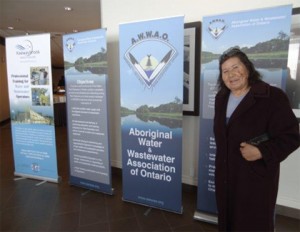Bill C-45 draws attention on World Water Day

World Water Day, which is held annually on March 22nd, is a means of focusing attention on the importance of freshwater and advocating for the sustainable management of freshwater resources.
One advocate for the water is Anishinabek Nation Women’s Water Commissioner, Josephine Mandamin. She has walked for the water around all five Great Lakes and from the four directions of North America to bring attention to the lifeblood of Mother Earth.
Mandamin was honoured by the Aboriginal Water and Wastewater Association of Ontario (AWWAO) at its conference in Sault Ste. Marie with a namesake annual award.
The Mandamin Cup – which is a water challenge cup – was presented to Marcel Sahbaquay of Wabigoon Lake Ojibway Nation for the best water in the North.
The Ontario Native Women’s Association’s Director of Policy and Research, Lana Ray, says that water should be a respected and honoured life force.
ONWA will be launching an Ontario Indigenous Women’s Water Commission to reassert the Traditional roles of Indigenous women with respect to the water and to further enhance women’s capacity through education about water conservancy, preservation and stewardship. The Commission will focus on cultural resurgence, as well as identify ways in which women’s Traditional responsibilities concerning the water can be carried out in a modern day context. The planning of the Water Commission involved the collaboration of Traditional knowledge holders, Grandmothers, and Aboriginal women representing various First Nations communities in Ontario.
“Water and the increasingly public issues around conservation and protection are mainstream discussion items that lack meaningful Indigenous participation and the inclusion of Indigenous knowledge,” said Ray. “ONWA is taking the call to action demanded by Aboriginal women across the province to provide this unparalleled opportunity to share Traditional knowledge, engage the greater public, and to influence water policy development that affects Ontario.”
Ray says this culturally significant role as water caretaker has been largely overlooked.
“It is also of growing concern that freshwater lakes, rivers and streams continue to be polluted, damaging the water quality for drinking purposes as well as harming wildlife,” said Ray. “This problem will only be exacerbated by the passing of Bill C-45, which removes protection and conservation for many of our vital freshwater sources.”
Ontario Regional Chief Stan Beardy says that World Water Day is important because it reminds all of us that the world’s freshwater is under threat and that we all need to act to ensure the protection of the waters for our survival and the survival of future generations.
First Nations are concerned about the safety of the waters of the Great Lakes which face multiple threats prompting the First Nations in the Great Lakes Basin area to strengthen their partnerships with each other and their commitment to protect these life-giving waters. The Anishinabek, Mushkegowuk and Onkwehonwe Water Declaration (2009) is a document that affirms First Nation Inherent rights and responsibility to protect the waters. The right of First Nations to the conservation and protection of the environment and the waters is recognized and affirmed by the United Nations Declaration on the Rights of Indigenous Peoples.
“The First Nations in Ontario have Treaties with Crown governments which set out the terms of our relationships and how lands and resources are to be shared. We maintain as we always have jurisdiction over the care of the waters in our territories. The First Nations Water Declaration re-affirms our collective rights and also makes clear that we will honour our responsibilities to care for the waters,” said Beardy.
“Recent numbers indicate that 28 First Nations communities are under boil water advisories, some of these communities have been under long term boil water advisories for years. This is simply unacceptable and we have been clear that investments in infrastructure are required and that the federal government must step up and address this situation,” said the Regional Chief.
A national assessment commissioned by the federal government and published in July 2011 indicates that an investment of $309 million is required to bring the water and wastewater systems of the First Nations in Ontario up to current federal government protocols.
Today, First Nations peoples have many water-related concerns including; water quality and quantity, industrial and ship-source pollution, fish and wildlife health, loss of biodiversity, human health effects and climate change.


